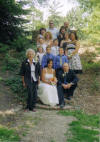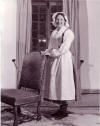


GENEALOGY
MATERNAL SIDE
WOYTOWICH LINEAGE
-
Unknown Woytowich
-
Married: [?]
-
Children:
-
Catherine (Ekaterina) Woytowich ( - c 1922), b. probably Stara Strelna, Belorussia
-
Married: Daniel Chwedchuk (1876-1949), b. Stara Strelna, Belorussia, d. Springfield, Massachusetts
-
-
Unknown Brother Woytowich
-
Married: [?]
-
Children:
-
Paul Woytowich (June 4, 1895 - November 23, 1950, b. Stara Strelna, Belorussia, d. [Springfield, Hampden, Massacusetts]
-
Ivan Woytowich (stayed in Stara Strelna, now Strelno)
-
-
-
-
WOYTOWICH
DESCENDANTS
ANCESTRAL GENEALOGICAL NOTES
-
Catherine (Ekaterina) Chwedchuk (Fled in c. 1914 to the Ural Mountains near Ufa where she died in 1921 together with her two daughters (died of cholera) when the family, that included Anton - but not Daniel who was in the USA since 1913 - left to return to Stara Strelna [Strelno, Poland].
-
Paul (Pavlo) Woytowich [c. 1895 - November 23, 1950 [Springfield, Hampden, Massacusetts]] went to USA c. 1913 and lived with Daniel Chwedchuk (1876-1949) [Fedchuk in the USA] who came alone to Springfield, Massachusetts, in 1913. Paul (Pavlo) Woytowich married a widow (who had two children) after 1949 [Sophie H]. He probably had no children of his own.
-
Stara Strelna [Old Strelna]: Later, until 1918, Strelno in German when it was located in Prussia; Afterwards, 1918-1939, Strzelno in Polish when it was located in Poland], Volost of Yanovo, Drohichin Region, Belorussia [Strelna in Belarus: СТРЕЛЬНА] - Belarus pre 1918 and post 1945, sometimes known as White Russia]
-
Village Strzelna, district of Drohiczynsk
-
Stara Strelna [Stara Strzelna] village, Brest Oblat, Ivanov Region, Belorussia, was near Kobrin, about 120 km east of Brest, and 20 km east of Drogichin [Drahicyn].
-
Village of Alexandrovka, Volost of Nagat [Nagadat], Sterlitamak Region, Oblast of Ufa, USSR, about 2000 kilometers from Stara Strelna [Strelno, Poland].
------------------------
-
Grandfather Daniel died in 1949 in Springfield, Mass., at the age of 73, as noted in a letter from his nephew Pavlo Woytovich. Mother kept a subsequent letter from Pavlo which I have read recently, from which it appears that father had written Pavlo about the estate, to which Pavlo was the sole heir. In the letter, father had apparently asked Pavlo if he would be good enough to pay a debt that Pavlo's brother Ivan in Poland never paid up. It was probably some part of the price for land that was sold to Ivan before father left for Canada in 1929, and which mother was also unable to collect when the rest of us departed in 1930. In any case, Pavlo 's letter made it clear that he would not pay that debt, and that there was not much left of the estate anyway, after funeral expenses. Besides, Pavlo noted, it was he who had to look after Daniel and his poor health during his retirement years. Pavlo stated that he would continue to correspond periodically if wished to do so, but to my knowledge, there was no further exchange of letters. It seems that squabbles over money can bring the best of friendships to an end.
I should note here that in 1989, during a six week tour and visit to the Soviet Union, Elva and I met members of a Woytovich family in the village of Strelno in Belorussia where I was born, but they claimed not to be related to Pavlo and his brother, Ivan. Some of the villagers had been notified through relatives of a friend of mine (Lida /Lagodich / Baggs of Kingston, Ont.) that we would be coming, and a half dozen ladies met us, including Anna Alexandrovna Woytovich and her husband, and Ooliana Michaelovna Woytovich, who claimed to have been my baby sitter when I lived there. We were surprised and overwhelmed to meet them, but also somewhat embarrassed that we had not thought about some kind of gifts or even chocolates to pass around. One of our bags temporarily left behind at the hotel in Brest was packed with gifts of clothing for my many second cousins in Russia, and I had no idea whom I might meet in Strelno. Besides, the jet lag and difficulties in getting to the village from Warsaw had apparently left us mentally sluggish.
Anna showed us through her log house which looked as if it had been there for a hundred years, but said that the original house that I lived in had been moved, and that this one was constructed in its place. It had the same old fashioned brick oven that I remembered, and the little pond where the kids skated during the winters in the 1920's was still there across the street from our house. Much had changed, of course. They had indoor plumbing, a TV set and radio, but no car. A combine lumbered along the dusty unpaved street while we were there, on its way to the collective farm where the villagers worked. The ladies that met us that afternoon were dressed in simple peasant clothes, as if they had just taken a break from harvesting in the fields. In response to my question about how they liked the farm work, Anna's husband said that there were too many bosses and not enough workers. It had been decided to combine their farm with another one to improve efficiency, but the expected improvement did not occur because the management and supervisory staff had not been reduced.
What bothered me later about the visit was that we had not been invited to have a snack or cup of tea, which was not at all in the Ukrainian tradition. Out west in Saskatchewan and also in Welland, mother would always bring out or offer something for guests before they departed, and other Ukrainian families that we knew did likewise. At first I thought that perhaps it was because they were subjected to the fallout from the Chernobyl nuclear power plant, and didn't want to offer us irradiated food. Or perhaps they felt restrained by the presence nearby of the Intourist driver who had brought us there in an official car, for he might have been suspected of being a government agent. Since coming across Pavlo Woytovich's letter to father about his brother Ivan's unpaid debt, however, I began to wonder if perhaps the Woytoviches there were actually my relatives, but were embarrassed to admit it in case I knew about that past history. Anna told me that Ivan had no family, but that might have been a cover up. Perhaps if she thought that I knew about Ivan's debt, she decided not to treat me as a guest or relative, in case I would bring up the subject. Come to think of it, she had not mentioned her husband's patronymic name, which might have been Ivanovich, in which case he would really be a relative. Getting records there seems to be impossible; the old church documents had been destroyed during the war, and cemetery markers of wood had long since deteriorated. It was suggested that perhaps some office in Pinsk might be of help in getting information about my ancestors, but I haven't taken time to investigate. ...
SOURCES
Leonard Chwedchuk, FROM REVOLUTION TO DEPRESSION
(Memoires of an immigrant family from Eastern Europe arriving in
Canada in 1930), (Ottawa, January, 1999), pp. 90-91 [Microsoft Word Document © Leonard Chwedchuk]
